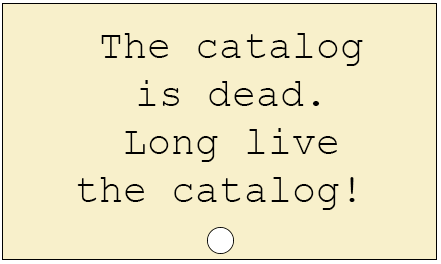Home » Posts tagged 'ils'
Tag Archives: ils
CUNY’s migration to a Library Services Platform
CUNY’s migration to a Library Services Platform (“LSP”) will provide unified services across the library. It will be a long journey, and we will be building up information for our roadmap as we reach different milestones.
To follow the journey, please consult the OLS Support Site: https://ols-support.cuny.edu/?q=systems/lsp
Is the catalog going away?
Note: For definitions of technical terms used throughout this post, please refer to the Glossary at the bottom of this entry.
The Office of Library Services (“OLS”) has taken the CUNY Libraries through the initial migration of library data from disparate and no systems into NOTIS (late 1980s/early 1990s) and then into Aleph circa 2002. It’s fifteen years later and we are looking to migrate again, this time to an LSP.
If you work in technical or access services, you’re used to the ILS being “the catalog” you use to perform your daily activities. You use Aleph to place orders, pay bills, catalog new acquisitions, check in serials, manage patrons, and keep track of all of the items going into and out of your library. You’re also aware that Aleph is a Windows application that needs to be installed on your workstation. You may have experienced the cumbersome and labor-intensive process of upgrading the system from one version to the next. When we migrate to an LSP, you will continue to have access to all of the tools you need to do your job: you will place orders, pay bills, catalog new acquisitions, check in serials, manage patrons, and keep track of all of the items going into and out of your library. However, the system you use to do all of these things will be different: LSPs are necessarily cloud-based so they can be accessed from any browser on any computer; updates are released on a regular basis and are done quietly in the background; to-do lists and workflows are built into the system; management of e-resources is baked right into the product and is not an afterthought. Generally speaking, an LSP is a system built for the modern library and is meant to make your daily work activities easier.
If you work in public services (i.e., reference or instruction), you’re used to the OPAC being “the catalog” you use to search the library’s holdings. However, LSPs do not come packaged with OPACs. Instead, they rely on integration with a discovery system to provide a public web interface. Therefore, when we finally migrate to an LSP, the OPAC as we know it will be gone. That is, the public-facing interface to Aleph that we have been using for 15 years will be deprecated and, in its stead, we will rely entirely on a discovery system to search our library collections. Luckily, we have been live with CUNY OneSearch since the Fall 2014 semester so we have a lot of experience with a discovery system! OneSearch is the catalog of our physical library collections across the University as well as local electronic and digital collections. Our patrons use OneSearch to find their textbooks, identify peer-reviewed articles for their research papers, conduct research across multiple disciplines when doing a literature review, and more.
 So, yes, in a sense, the catalog is going away—really, though, it’s metamorphosing. We will choose a new LSP that will allow us to more easily conduct all essential library activities traditionally carried out by an ILS. Our bibliographic, holding, and items records will retain a familiar form, our invoices will be maintained, our orders will still be tracked, and our patrons will continue to be managed. The OPAC, on the other hand, is certainly going away. However, we will continue to discover our library collections through OneSearch so we will continue to have a public-facing web interface for our library collections.
So, yes, in a sense, the catalog is going away—really, though, it’s metamorphosing. We will choose a new LSP that will allow us to more easily conduct all essential library activities traditionally carried out by an ILS. Our bibliographic, holding, and items records will retain a familiar form, our invoices will be maintained, our orders will still be tracked, and our patrons will continue to be managed. The OPAC, on the other hand, is certainly going away. However, we will continue to discover our library collections through OneSearch so we will continue to have a public-facing web interface for our library collections.
Glossary
- Integrated Library System (ILS)
- An enterprise suite of software applications for a library, used to track items owned, orders made, bills paid, and patrons who have borrowed. CUNY uses Ex Libris’s Aleph software and frequently refers to it as “Aleph,” “Aleph GUI,” and “Aleph client.” Aleph consists of several modules: cataloging, acquisitions, serials, circulation, and OPAC.
- Online Public Access Catalog (OPAC)
- A public-facing web interface for a library’s catalog, used by the public to search the database of materials held by a library or group of libraries. CUNY uses the OPAC module of Ex Libris’s Aleph and brands it as “CUNY Catalog” (formerly “CUNY+” or “CUNY Plus”).
- Library Services Platform (LSP)
- A cloud-based library system that integrates the acquisition and management of electronic and print resources into a common platform, data stores, and task workflows.
- Discovery system
- A public-facing web interface used by the public to find materials in library collections and gain access to items of interest through the appropriate delivery mechanisms. Discovery products are independent from the specific applications that libraries implement to manage resources, such as integrated library systems, library services platforms, repository platforms, or electronic resource management systems. They use more sophisticated search technologies, including relevancy ranking and faceted search. CUNY uses Ex Libris’s Primo software and brands it as “CUNY OneSearch.”

